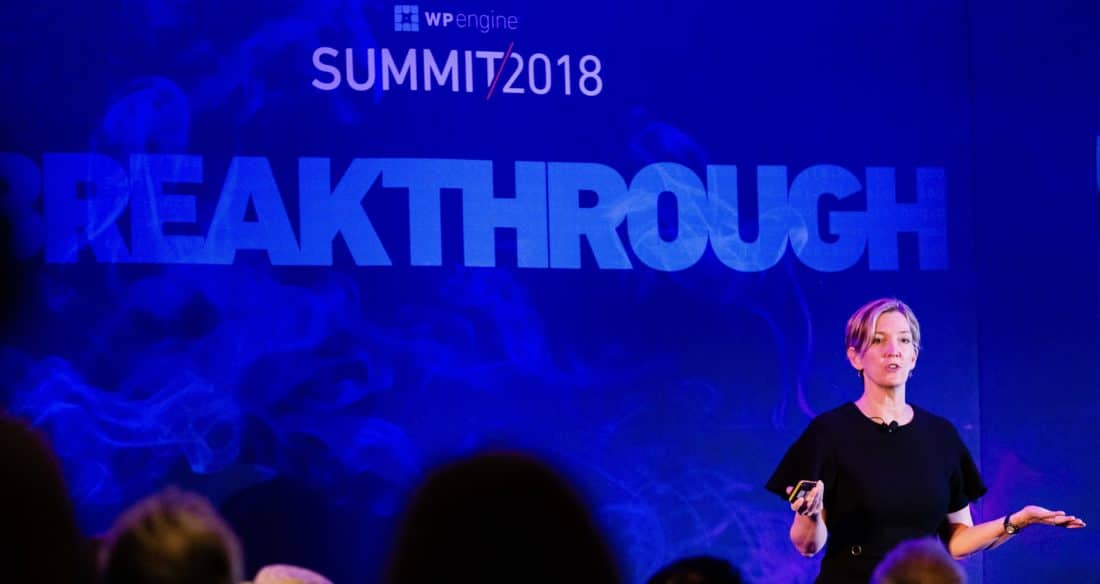Digital channels are now a part of life, and marketers need to learn to work with this reality. That was the conclusion of the second annual WP Engine Summit in Europe, held recently in central London.
Progressive digital marketers and innovative thinkers came together for a wide ranging discussion on trends such as artificial intelligence and voice technology, and how these technologies can be used to power future digital breakthroughs. Additionally, attendees were treated to an inspirational keynote speech by Norwegian free skier and BASE jumper, Karina Hollekim who spoke about her personal breakthrough and how to live beyond fear.
One of the key things that all the speakers agreed on was the primacy of digital marketing and how it’s no longer optional or even an occasional tool, but an intrinsic part of who we are. Several workshops homed in on WordPress skills and features such as progressive web apps, accelerated mobile pages, headless content management systems and the new Gutenberg website builder, that enable the new digital experience.
The ascendancy of digital channels doesn’t make us any less human, argued Dr. Chris Brauer, Director of Innovation at Goldsmiths, University of London, He explained one of his many breakthrough moments was realizing that AI would never make humans redundant.
AI is actually making us more human, he said. AI’s benefit comes in freeing humans from routine work and then harnessing it to augment human abilities doing creative, non-routine manual and cognitive work. As examples, Brauer noted how AI can diagnose X-rays more accurately than humans can, leaving doctors free to spend more time with patients administering an actual treatment.
Digital is even making brands more human, according to Sat Dayal, a senior director at Edelman. Social media has given brands a more powerful role in society because social media allows consumers more influence over brands than they can ever have over government.
This need for a two-way dialogue has led to what Dayal calls a “new brand democracy,” where brands are trusted more than institutions. Edelman’s Trust Barometer Study found 67% of consumers made a decision about a brand based on a cause they supported. As an example, Nike’s polarizing work with football player Colin Kaepernick was highlighted, which drove a 30% lift in online sales.
For Generation Z in particular, the digital experience is an essential part of the human experience. This generation is most fully immersed in the online world, because it has never known life without the internet. It’s where they find love and jobs, communicate with friends and family, and for 61% of Gen Z; they can’t last more than 5 hours without the internet.
Mary Ellen Dugan, CMO of WP Engine, recalled seeing someone criticize a member of Gen Z for looking at her phone during a conversation, and receiving the reply, “But everyone I love is on my phone.”
This is why Gen Z has such high expectations for personalization online, with 67% believing that websites should know what they are looking for before they tell them. In fact, Gen Z’s faith in the online world is so complete that a recent WP Engine survey found 62% would swap a college degree for unlimited access to the internet (up from 47% in 2017).
The attachment to digital channels has some profound social consequences, outlined by Oliver Franklin Wallis, an editor at Wired magazine. He pointed out that we are all living in our own “personal realities” and the only way to break through is to tap into people’s emotions.
“Built for engagement, not truth”
Fake news, he said, works not because of bots and algorithms but because it’s designed to give you a gut reaction so that you respond and share. You can iterate to provoke emotion on a mass scale—a recent ad featured on a social media platform was refined 5.9 million times in order to continually elicit a heightened reaction.
The internet has “fragmented out collective reality” said Gianfranco Chicco, European marketing director of The Webby Awards. “Algorithms are built for engagement, not truth,” he said. He gave examples of ways in which users are fighting back: Bot Sentinel picks out bots and trolls; News Guard validates reputable news sources; Fakespot flags fake news; and Pop Your Bubble will scan your social media feeds and then helpfully expose you to different ideological points of view.
Several workshops took deeper dives into specific tools meant to enable experimentation and faster time to market for digital experience creators. WordPress, which powers nearly one third of all websites and one fifth of the top 200,000 websites, is set to announce one of its biggest breakthroughs, Gutenberg, a component-based approach to building websites and web pages. While speaking at the summit, Jason Cohen, founder and CTO of WP Engine said, “[Gutenberg] promises to revolutionize the entire publishing experience including giving brands an unprecedented ability to customize sites.”
Gutenberg brings far greater agility to the website build by introducing reusable building blocks that can be customized with, for example, color palettes or headline formats, to make sure pages are always on-brand. The blocks are stored in a central library and can be used to build as many as 20 websites in one afternoon.
“The marketer is empowered to go crazy in relative safety,” Cohen said. “Gutenberg is not just the future of WordPress, it’s the future of the entire Web.”
